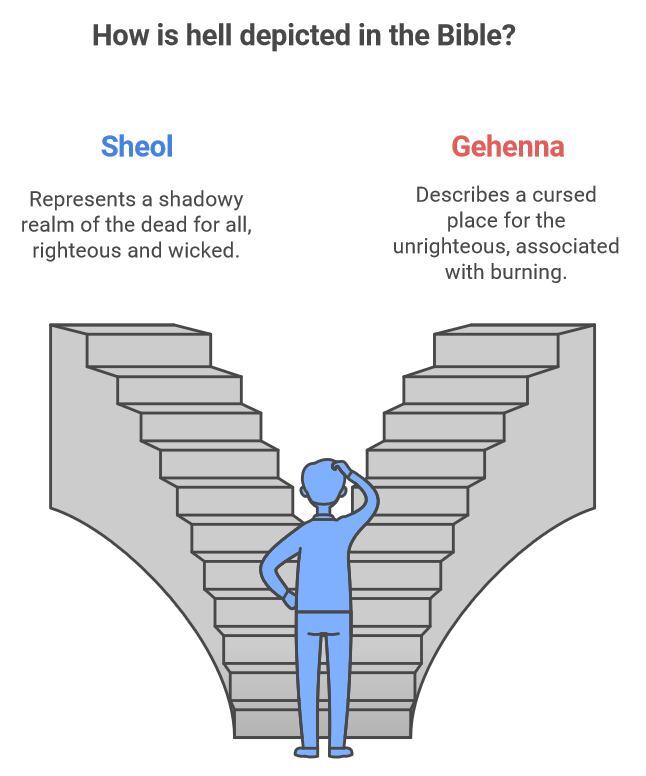What if everything you thought you knew about hell was wrong? The idea of a place of eternal torment has haunted humanity for millennia, etched into sermons, art, and folklore. But is hell real? Or is it a tool crafted to instill fear and obedience?
The Bible, as the most influential book in human history, holds the answers. Yet, as we dive into its depths, the truth may leave you more unsettled than reassured.
The Reality of Hell: A Question for the Ages
From Dante’s Inferno to fiery revivalist preaching, the concept of hell is nearly universal. But its specifics vary widely across cultures and religions. Some see it as literal flames; others as a state of separation from God. Still, the question remains: does the Bible actually teach that hell is real? Or have centuries of human interpretation distorted its message?
To answer, we must strip away tradition and examine Scripture itself. What we find might shake even the firmest faith.
Biblical Descriptions of Hell: Fire or Metaphor?
The Bible mentions hell in several forms. The Old Testament uses the word Sheol, often translated as “the grave” or “the pit.” It’s not a fiery abyss but rather a shadowy realm of the dead, where all—righteous and wicked—go after death.

In the New Testament, Gehenna (Greek word) emerges. This term, drawn from the Valley of Hinnom near Jerusalem, refers to a cursed place where trash and bodies were burned. Jesus uses Gehenna to describe the fate of the unrighteous:
**Matthew 10:28 (NKJV)**:
“And do not fear those who kill the body but cannot kill the soul. But rather fear Him who is able to destroy both soul and body in hell (Gehenna).”
This verse reveals two critical elements:
- Hell is a place of destruction, not just suffering.
- It’s tied to divine judgment, not random misfortune.
But is this destruction eternal? Theologians debate: Is hell everlasting torment, or annihilation—a permanent erasure from existence?
The Eternal Debate: Everlasting Torment or Annihilation?
Perhaps the most controversial aspect of hell is its duration. Many Christians believe in eternal conscious torment, based on verses like:
“And these will go away into eternal punishment, but the righteous into eternal life” (Matthew 25:46, ESV).
Yet, the Greek word for “eternal” (aiónios) can mean “age-lasting” rather than infinite. This has led some to argue for annihilationism—the belief that the wicked are destroyed completely, ceasing to exist after judgment.
Supporting this view is Romans 6:23:
“For the wages of sin is death, but the free gift of God is eternal life in Christ Jesus our Lord.
If eternal life is a gift, is it logical to assume the unrighteous receive eternal life in torment? Or does death mean exactly that: the end?
Hell as Separation from God: The Ultimate Tragedy
While fire and brimstone dominate popular imagery, the Bible presents another, more haunting dimension of hell: separation from God. Paul writes:
“They will suffer the punishment of eternal destruction, away from the presence of the Lord and from the glory of His might” (2 Thessalonians 1:9, ESV).
This isn’t just a physical torment but a spiritual void. To be cut off from God, the source of life and goodness, is a punishment more terrifying than flames. Imagine an existence where hope, joy, and love are forever absent.
What Did Jesus Really Say About Hell?
Jesus spoke about hell more than anyone else in Scripture. But His warnings were often directed at the religious elite, not the common sinner. This is crucial. Hell, in Jesus’ teaching, isn’t just a place for “bad people.” It’s a destination for those who reject God’s truth and persist in hypocrisy.
“You snakes! You brood of vipers! How will you escape being condemned to hell?” (Matthew 23:33, NIV).
These harsh words weren’t for atheists or criminals but for self-righteous leaders who exploited their positions. This flips the modern narrative: hell isn’t just for the blatantly wicked but for those who feign holiness while their hearts remain far from God.
The Justice of Hell: Too Harsh or Perfectly Fair?
One common objection to hell is that it seems unjust. Why would a loving God sentence anyone to eternal suffering for finite sins?
The answer lies in the nature of sin and the character of God. Sin isn’t merely breaking rules; it’s rebellion against the Creator. To sin is to reject infinite goodness, deserving infinite consequence. Yet, God’s justice is always paired with His mercy. As Ezekiel writes:
“‘Do I take any pleasure in the death of the wicked?’ declares the Sovereign Lord. ‘Rather, am I not pleased when they turn from their ways and live?’” (Ezekiel 18:23, NIV).
Hell exists not because God delights in punishment but because He honors human choice. Rejecting Him has eternal consequences, just as accepting Him brings eternal life.
Modern Misunderstandings: Cultural Myths vs. Biblical Truth
Pop culture has warped our understanding of hell. From cartoonish devils with pitchforks to horror movies, the true nature of hell is often obscured. Worse, many preachers have used hell as a tool of manipulation, turning it into a fear tactic rather than a solemn truth.
This misuse has led some to reject hell entirely, dismissing it as outdated or cruel. Yet, the Bible warns against picking and choosing doctrines to suit our preferences. Hell is real, not because God is cruel but because His justice is perfect.
Hell and the Gospel: A Message of Hope Amidst Warning
If hell is so terrifying, why would a loving God allow anyone to go there? The answer lies in the gospel. Hell isn’t God’s desire for anyone. He has provided a way of escape through Jesus Christ.
“For God did not send His Son into the world to condemn the world, but to save the world through Him” (John 3:17, NIV).

Hell serves as a backdrop that magnifies the beauty of salvation. It reminds us of what we’re saved from and what we’re saved for: eternal communion with God.
Living in Light of Eternity: What Should We Do?
Understanding the reality of hell isn’t just theological. It demands a response. If hell is real, it’s the ultimate motivation to share the gospel, live righteously, and seek God with urgency.
“The Lord is not slow in keeping His promise… Instead, He is patient with you, not wanting anyone to perish, but everyone to come to repentance” (2 Peter 3:9, NIV).
This patience is a gift. But it won’t last forever. The time to choose is now.
Conclusion: Is Hell Real? Your Decision Matters
So, is hell real? The Bible answers with a resounding yes. But its reality isn’t meant to paralyze us with fear. Instead, it’s a call to action—a reminder of God’s justice, mercy, and the stakes of eternity.
The terrifying truth isn’t just that hell exists. It’s that many live as though it doesn’t. Don’t let that be you. Seek God while He may be found, and embrace the hope offered through Jesus Christ. Eternity is too long to get it wrong.







